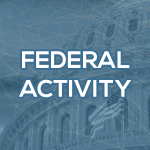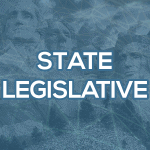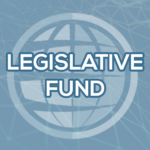As Congress returns from its August recess, congressional lawmakers face fewer than 30 days to avoid a government shutdown while also confronting a crowded legislative agenda. Priorities include funding the government and moving the defense policy bill. Efforts for a second budget reconciliation package (“Big Beautiful Bill 2.0”) and additional Trump administration nominations remain on the table.
The U.S. House Financial Services Committee recently solicited public feedback on federal consumer financial data privacy law and potential updates for today’s financial services sector. The Committee posed questions that focus on whether the Gramm-Leach-Bliley Act (GLBA) should be updated, preempt state laws, and align with broader federal privacy standards. They also explore potential changes to definitions, exemptions, consent and data deletion requirements, liability structures, and limits on data collection, retention, and sharing. RMAI submitted a response addressing several of the Committee’s specific questions. You can view RMAI’s response here.
The Department of Justice also issued a Request for Information seeking input on state laws that hinder the national economy or interstate commerce. The inquiry centers on identifying laws that impose unnecessary costs across state lines, assessing whether they are preempted by existing federal authority, and considering legislative or regulatory solutions, including which federal agency is best suited to act. RMAI provided comments to that inquiry as well, which can viewed here.
In addition, the CFPB released an Advanced Notice of Proposed Rulemaking on whether to substantially narrow its supervision of nonbank entities in markets including debt collection. Since 2012, the CFPB has defined larger participants in the consumer debt collection market as firms with more than $10 million in annual receipts. This definition places larger firms under direct CFPB supervision. The Bureau is now considering increasing the $10 million threshold to better reflect industry developments and align with Small Business Administration (SBA) standards. RMAI is preparing comments ahead of the September 22, 2025, deadline.
Finally, federal agencies have published the Spring 2025 Unified Agenda of Regulatory and Deregulatory Actions, outlining both near-term and long-term rulemaking plans. Agency agendas can be viewed here.
RMAI monitors, tracks, and responds to legislative and regulatory activity in all 50 states as the need arises. Backed by RMAI’s State Legislative Committee and a team of state lobbyists, RMAI educates legislators and regulators about the industry and the negative impacts or unintended consequences a bill would have on businesses and consumers. If you have an interest in volunteering in RMAI’s grassroots advocacy efforts, please contact RMAI General Counsel & Senior Director of Government Affairs David Reid at (916) 779-2492 or [email protected].
RMAI will have a comprehensive State Legislative Report of legislation which has been adopted in the Fall Magazine. Be sure to read the article when it arrives in a few weeks.
While state legislatures tend to be relatively quiet in the Fall, here are a few bills we are continuing to engage on:
Massachusetts SB 2559 – This bill would, among other things: (1) increase the garnishment exemption from 50x state minimum wage to 65x state minimum wage; (2) reduce the statute of limitations (SOL) in an action for the collection of a consumer debt from six to five years; (3) prohibit the revival of a debt that is beyond the statute of limitations through the making of a payment; and (4) reduce the time allowed to take action to enforce a judgment from 20 to 10 years but allows renewing the judgment for an additional 10 years. If passed, the bill would take effect on January 1, 2026. [RMAI had been opposing this bill since 2014 when it was first introduced. After eight years of negotiations and countless amendments, RMAI, other industry participants, and consumer advocates agreed to amendments that resulted in a neutral position by the industry. Among items removed from the bill through RMAI’s efforts from its 2014 introduction: (a) 90x minimum wage garnishment exemption; (b) expungement of the debt once the SOL expires; (c) reducing the SOL from six to three years; (d) preventing the tolling of the SOL through a payment prior to the expiration of SOL; (e) reducing the enforcement of a judgment from 20 to 5 years with no renewal; (f) applying the bill’s provisions to real property; and (g) once the consumer exceeds the exemption threshold, only being able to garnish on income above the threshold.]
New York AB 8427-A/SB 8416 (NY Attorney General Program Bill) – This bill would enact the “Fostering Affordability and Integrity through Reasonable (FAIR) Business Practices Act” to expand the attorney general’s ability to protect New Yorkers from unfair, deceptive and abusive business practices. [RMAI was in strong opposition due to the bill containing: (1) an enhanced private right of action where the consumer does not have to show an actual injury and (2) a public registry of all UDAAP settlements. RMAI has had three very constructive meetings with the New York Attorney General’s Office in the past month explaining our opposition. Through RMAI’s efforts and that of the New York Business Council, of which RMAI is a member, the bill was amended to resolve the concerns raised by RMAI. Removed from the version which passed the Senate was language that: (i) allowed a third party to bring a private right of action on behalf of others without their consent, (ii) allowed the plaintiff to bring suit without actual injury, (iii) created a public registry, and (iv) created higher penalties for a private right of action. With these changes, the bill is generally in line with existing UDAAP laws from other states. This bill has passed both houses of the legislature and is awaiting to be sent to the Governor.]
Pennsylvania HB 1731 – This bill would adopt the Consumer Debt Collection Fairness Act which would: (1) require any legal action to collect consumer debt to include detailed documentation, including the name of the original creditor, the last four digits of the account number, an itemized statement of the amount owed, proof of ownership of the debt, and a copy of the original contract or charge-off statement; (2) reduce the statute of limitations from 4 to 3 years on consumer debt; (3) prohibit courts from entering default judgments against consumers unless the plaintiff provides an affidavit of facts based on personal knowledge, all required documentation, and proof of proper service and notification of consumer rights; and (4) require a consumer notice informing consumers of their rights to dispute the debt, request documentation, and seek legal assistance. [RMAI is opposed to and closely monitoring this legislation. As of now, we believe this bill only has a 50/50 chance of passing the House but a very low chance of Senate passage. Should intel suggest otherwise, RMAI is prepared to step in with active opposition.]
Puerto Rico PS 255 [Hyperlink is not provided as the text is in Spanish] – This bill would adopt an overly broad definition of “medical debt” which would apply to any medical debt charged to a general-purpose credit card. [RMAI opposes any medical debt bill that imposes medical debt restrictions on financial service products. We insist the definition apply only to debt owed to a medical provider. The Puerto Rican Legislature operates in Spanish, including the website and bill text, which adds a certain challenge in lobbying efforts. However, RMAI has retained a strong and highly respected bilingual lobbying firm to assist the association in obtaining amendments.]
Fourth Circuit Upholds Exclusion of Expert Witness in TCPA Case
Davis v. Capital One N.A., No. 24-1507, 2025 LX 344610 (4th Cir. Aug. 25, 2025)
A consumer received numerous prerecorded voicemails on his cell phone from a creditor attempting to collect a debt. The consumer called the creditor and informed a representative that he had never been a customer of the creditor and that he was not the person who owed the debt. The representative assured the consumer that the calls would cease but unfortunately wrote down the wrong number, so they continued until the consumer called a second time.
As it turned out, the creditor was mistakenly calling the consumer because the telephone number had been reassigned to the consumer after the actual debtor gave up the number.
The consumer filed a class action lawsuit against the creditor alleging it violated the Telephone Consumer Protection Act “because they used an artificial or prerecorded voice and the recipients never consented to receive calls.” The proposed class was defined as:
All persons or entities throughout the United States (1) to whom [the creditor] initiated a call (2) directed to a number assigned to a cellular telephone service, but not assigned to a current account holder of [the creditor] (3) in connection with which [the creditor] used an artificial or prerecorded voice (4) from four years before the filing of certification.
To determine the feasibility of identifying class members, the consumer retained an expert witness who “asserted that her proposed methodology made it possible to identify individuals to whom [the creditor] initiated prerecorded calls but who were not [the creditor’s] customers.” She admitted, however, that she had never fully implemented the methodology.
The creditor moved to exclude the testimony of the consumer’s witness based on its own witness’s testimony that discredited the methodology, and the trial court agreed that the methodology “failed to identify proposed class members with a sufficient—or any—degree of reliability or feasibility.” Therefore, the trial court ruled the testimony of the consumer’s witness inadmissible and, for the same reason, determined the consumer failed to establish the ascertainably of the class. Thus, the trial court also denied the motion for class certification and the consumer appealed.
On appeal, the U.S. Court of Appeals for the Fourth Circuit, in an unpublished opinion, first addressed the trial court’s exclusion of the consumer’s expert witness. In addition to the proposed methodology never having been fully tested, the methodology depended on data that would be provided by third parties. However, two of the third parties “doubted whether they could reliably produce the requisite data.” Accordingly, the Fourth Circuit ruled that the trial court’s “conclusion that [the witness’s] testimony was not the product of reliable principles and methodology was thus well supported.”
The Court next reviewed the trial court’s denial of class certification. The Court explained that to satisfy the ascertainability requirement, “the district court must be able to ‘readily identify the class members in reference to objective criteria’ and it must be ‘administratively feasible’ for the court can do so.”
The Court noted that the consumer primarily relied on his expert witness’s testimony to establish ascertainability and “failed to identify objective criteria that would allow members of the proposed class to be readily identified without extensive and individualized fact-finding or ‘mini-trials.’”
Therefore, the Court of Appeals affirmed the order of the trial court in full.
New York DFS Fines Licensee $2M for Violations of Cybersecurity Regulations
In the matter of Healthplex, Inc.
In November 2021, an employee of an entity licensed by the New York Department of Financial Services (“DFS”) received a phishing email that “invited the employee to enter their business email login credentials to receive a fax message, which they did. This allowed the threat actor access to the employee’s Microsoft Office 365 account.” The licensee became aware of the cyber event approximately 24 hours later and conducted a forensic review that revealed the nonpublic information (“NPI”) of “tens of thousands” of New York residents had been compromised.
The licensee reported the event to DFS in April 2022, and DFS investigated and discovered that the employee, a customer service representative, had been with the licensee for 20 years and had over 100,000 emails containing customers’ private health data and NPI in the compromised email box.
Pursuant 20 23 NYCRR § 500.17(b), licensees are required to annually certify to DFS that they are in compliance with the Cybersecurity Regulation. This licensee certified compliance each year from 2017 through 2021.
Based on its investigation, DFS alleged the licensee violated four Cybersecurity Regulations:
- At the time of the Cyber Event, the licensee had not fully implemented multi-factor authentication (“MFA”) on its Office 365 environment, and no reasonably equivalent or more secure access controls were approved in writing by the Company’s Chief Information Security Officer, in violation of 23 NYCRR § 500.12(b);
- The licensee failed to include policies and procedures for the secure disposal on a periodic basis of NPI in its cybersecurity program, in violation of 23 NYCRR § 500.13;
- The licensee failed to notify the Department of the Cyber Event within seventy-two hours, in violation of 23 NYCRR § 500.17(a); and
- The licensee improperly certified compliance with the Cybersecurity Regulation for the calendar years 2017-2021, in violation of 23 NYCRR § 500.17(b).
On August 14, 2025, DFS announced it had entered into a Consent Order with the licensee that included:
- A $2M civil monetary penalty;
- A requirement that the licensee continue to strengthen its controls to protect its information systems and the NPI it maintains in accordance with the requirements of the Cybersecurity Regulation; and
- A requirement that the licensee hire a third-party auditor to conduct an audit of current MFA controls related to the integrated infrastructure in which the business operates and the shared systems that support the core business functions.
Eighth Circuit Holds Validation Letter Did Not Violate FDCPA After Cease Communication Request
Denmon v. Kan. Couns., Inc., No. 23-3612, 2025 LX 361345 (8th Cir. Aug. 13, 2025)
A consumer owed a debt to a healthcare provider, and the provider assigned the debt to a collection agency that sent the consumer an initial debt collection letter in 2017. Almost four years later, the consumer sent a letter to the agency stating she had discovered the agency furnished information about the debt to a credit reporting agency (“CRA”) and that she disputed the debt. She further stated “[p]lease do not contact me a about this debt.” The agency responded by sending a letter validating the debt and enclosing supporting documents.
The consumer brought an action against the agency alleging it violated the Fair Debt Collection Practices Act (“FDCPA”) when it sent her the letter validating the debt after she had instructed it to cease communications. Section 1692c(c) of the FDCPA states: “If a consumer notifies a debt collector in writing that the consumer refuses to pay a debt or that the consumer wishes the debt collector to cease further communication with the consumer, the debt collector shall not communicate further with the consumer with respect to such debt,” subject to several exceptions inapplicable here.
The agency moved for summary judgment arguing that the consumer lacked Article III standing because she did not suffer a tangible injury. The consumer moved for summary judgment arguing her injury was sufficient “because the single, unwanted letter sent by [the agency] ‘intruded upon her seclusion and invaded her privacy.’” The trial court agreed with the consumer and concluded the letter violated the FDCPA and the agency appealed.
On appeal, the U.S. Court of Appeals for the Eighth Circuit noted that while the consumer’s complaint was based on the FDCPA, the Fair Credit Reporting Act (“FCRA”) was also in play. Specifically, the Court noted that the consumer’s letter appeared to be a dispute about the credit reporting, and that under the FCRA:
The obligations of a debt collector who furnished information to a CRA and who receives a notice directly from the consumer disputing the accuracy of the information it furnished — precisely the substance of [the consumer’s] March 30, 2021 fax to [the agency] — include conducting an investigation of the disputed information, completing its investigation of the dispute, and reporting the results of the investigation to the consumer…
The court raised this question: “Why would [the consumer] add a ‘do not contact me about this debt’ footnote to a letter complaining that [the agency] furnished false information to a CRA? The no-contact request was almost certain to be ‘violated’ if [the agency] complied with its FCRA obligations.” The Court continued:
If a “consumer protection” lawyer drafted this deceptive letter with the intent of trapping [the agency] in an indefensible FDCPA lawsuit, sanctions might be in order. In any event, we conclude the March 30, 2021 letter is not a valid basis for a § 1692c(c) claim.
On the issue of standing, the Court held the consumer lacked “Article III standing under the governing TransUnion standards because [the consumer] did not suffer an intangible injury that has a close relationship to harms traditionally recognized as providing a basis for an intrusion upon seclusion lawsuit.” The Court explained:
There is nothing inherently bothersome, intrusive, or invasive about a collection letter delivered via U.S. Mail, particularly when the letter was mandated by the FCRA for [the consumer’s] benefit. Even if unwanted, how could a reasonable jury find that this single, invited response “would be highly offensive to a reasonable person” who had not paid a valid debt for many years?
The Appellate Court vacated the judgment of the trial court and remanded the matter with instructions to dismiss the consumer’s complaint.
RMAI Membership Renewals are Coming on October 1st
Be on the lookout for your 2026 renewal invoice, which will be distributed on October 1st. Things to review on your invoice include:
- Confirming the Primary Contact is accurate.
- Confirming the correct Paid Additional Representatives, if applicable.
- If you have updates (additions, removals, or substitutions of an existing representative for another employee), please provide those edits upon renewing. You can do this by mailing in your invoice and writing in the updates, or you can reach out to our Membership Marketing Coordinator, Nicole Canon at [email protected] and she will make the updates for you.
- Donate to RMAI’s Legislative Fund
- Take note of the voluntary donation on your invoice which goes toward RMAI’s Legislative Fund. You may choose to donate the suggested amount or an amount of your own choosing. All donations help RMAI continue to fight for our industry across the nation!
Q4 Membership Promotion Starts October 1st – Refer a Peer
Beginning October 1st, our Q4 new membership offer ‘15 months for the price of 12’ will also take effect, making it a great time to refer an industry peer to join RMAI! If you know someone who would make a great member, let them know that new members joining October 1st – December 31st will receive membership for the remainer of 2025 through December 2026.
Offer to be a reference for them and direct them to our online application to take the first step towards membership. RMAI thanks you for your membership and your continued support, and we look forward to another amazing year with you!
Welcome, New Members
CastleWise Insurance and Licensing | FL
Greeting Team, LLC dba Customer Care Global | IL
Allied Alliance Group, Inc | NY
Omega RMS, LLC | MO
Service Financial Company | KY
For a complete list of RMAI members (including contact information), login to check out the Member Directory.

Contribute to the Legislative Fund with Your 2025 Renewal
What a year 2025 has been, and we can’t than all of our members enough for their contributions to our Legislative Fund, which has helped us retain 12 lobbyists on your behalf.
With that in mind, your 2026 renewal invoices are being distributed on October 1st, 2025, and will continue through the end of the year. This is a perfect time to contribute to RMAI’s Legislative Fund to keep RMAI going into 2026. Please take note of the voluntary donation listed on your invoice; however, we appreciate any donation while you renew your membership dues. Please consider donating to RMAI’s Legislative Fund with your renewal this year.
About the Legislative Fund
RMAI actively monitors and responds to state and federal measures affecting how our members do business. Your contributions to the Legislative Fund extend the reach of RMAI’s advocacy across the country where and when needed. Read more about the Legislative Fund.

Upcoming Webinar
Register for our September 23rd The Evolution of Fintech: “What is Fintech Today and Where is it Going:” webinar our presenters will explore how product lines are evolving, the models driving origination, and the trends shaping opportunities across prime and underserved markets.
Recorded Webinar
Recorded on September 11, 2025 you can register for a CastleWise Sponsored Webinar: Insuring AI Risk in Collections, In this session, presented in partnership with CastleWise Insurance & Licensing and Armilla AI, the presenters explored two groundbreaking insurance solutions designed specifically for businesses deploying AI in collections:
- AI Liability Policy (Affirmative Coverage):Protects collection agencies, debt buyers, technology vendors, and creditors from liability risks arising from the use of AI tools, including compliance missteps, bias, or unintended outcomes.
- AI Model Warranty Policy:Provides financial protection when AI models underperform against agreed benchmarks, ensuring that the investment in AI technology delivers measurable results
Chief Compliance Officer Webinar Series (Package or Individual)
This CCO Bundle includes five courses focusing on developing and maintain your compliance program within your company. You can Register for all five (5) or pick and choose individual courses.
#1. From Paper to Practice: Building Policies & Procedures that Protect, Perform, and Prevail – September 17, 2025
#2. From Mandate to Motivation: Building a Risk-Proof and Engaging Compliance Training Program
October 29, 2025 – Building a Risk Assessment and Audit Program Tailored to the Size and Scale of your Organization
From Onboarding to Offboarding: Building Rock-Solid Vendor Partnerships in Collections –November 5, 2025
A CCO’s Guide to Impactful Board and Executive Reporting – December 5, 2025
*To see full descriptions of each webinar check out our website by clicking this link
Pricing: Package
Member: $200
Non – Member: $350
Pricing: Individual
Member: $64
Non – Member: $94
Click here for more information on our live and recorded educational webinars. Contact Shannon Parod-Tsui at [email protected] to find out more about sponsoring an RMAI webinar.

Congratulations to our new and renewed Certified Receivables Compliance Professionals (CRCP) & new & renewed Certified Receivables Businesses (CRB)!
CRCP New
Michael Becker, RMAI
Jamie (Jaymes) Brown, The Moore Law Group
Malissa Brown, TRAKAmerica
Owen Compton, The Cook Law Office
Kyle Cragun, EverChain
Jessica Fagen, The Moore Law Group
Michael Moretellito, Velocity Portfolio Group
Lauren Summers, HS Financial Group
CRCP Renewals
Andrew Blady, Spring Oaks Capital
Mark Cassidy, Resurgent Capital Services
Amy Dowdey, Denali Capital
Mellisa Massey, National Credit Adjusters
James Mastriani, Velocity Portfolio Group
Altaf Sayed, Epicenter Technologies
Sue Unterberger, Jefferson Capital
Brian Valentin, Lockhart, Morris & Montgomery
Richard Weissman, Singer Weissman
CRB New
Stillman Law Office
CRB Renewals
Premium Asset Recovery Corporation (PARC)
View all certified businesses and vendors.
View all certified individuals.
Certification Resources on the RMAI Website
RMAI has all the necessary resources you would need to help you through both individual & business certification located on our Certification Webpage. This includes resources for becoming certified for the first time as well as resources for renewals.
Resource Examples for Individuals:
- 7 Steps to Earn a Certified Receivables Compliance Professional
- Education Credit Forms for the past two years of RMAI conferences
- Authorized Education Providers
Resource Examples for Businesses:
- 7 Steps to Earn a Certified Receivables Business or Certified Receivables Vendor
- Audit Extension Request Form
- Sample Policies and Procedures
There are many more resources available to you on the certification webpage, but we also welcome phone calls and emails with any questions you have. Contact Shannon Parod-Tsui @ [email protected] or call 916-482-2590.
View our full list of certification resources.

RMAI Membership Renewals are Coming on October 1st
Be on the lookout for your 2026 renewal invoice, which will be distributed on October 1st. Things to review on your invoice include:
- Confirming the Primary Contact is accurate.
- Confirming the correct Paid Additional Representatives, if applicable.
- If you have updates (additions, removals, or substitutions of an existing representative for another employee), please provide those edits upon renewing. You can do this by mailing in your invoice and writing in the updates, or you can reach out to our Membership Marketing Coordinator, Nicole Canon at [email protected] and she will make the updates for you.
- Donate to RMAI’s Legislative Fund
- Take note of the voluntary donation on your invoice which goes toward RMAI’s Legislative Fund. You may choose to donate the suggested amount or an amount of your own choosing. All donations help RMAI continue to fight for our industry across the nation!
Q4 Membership Promotion Starts October 1st – Refer a Peer
Beginning October 1st, our Q4 new membership offer ‘15 months for the price of 12’ will also take effect, making it a great time to refer an industry peer to join RMAI! If you know someone who would make a great member, let them know that new members joining October 1st – December 31st will receive membership for the remainer of 2025 through December 2026.
Offer to be a reference for them and direct them to our online application to take the first step towards membership. RMAI thanks you for your membership and your continued support, and we look forward to another amazing year with you!
Welcome, New Members
CastleWise Insurance and Licensing | FL
Greeting Team, LLC dba Customer Care Global | IL
Allied Alliance Group, Inc | NY
Omega RMS, LLC | MO
Service Financial Company | KY
For a complete list of RMAI members (including contact information), login to check out the Member Directory.

2026 RMAI Annual Conference | February 9-12, 2026

RMAI LEGISLATIVE FUND CONTRIBUTORS SEPTEMBER 1, 2024 – SEPTEMBER 12, 2025
Diamond
Absolute Resolutions Corp.
Cavalry Investments, LLC
Crown Asset Management, LLC
Resurgent Holdings, LLC
Second Round, LP
TRAKAmerica
Velocity Portfolio Group, Inc.
Titanium
Cascade365 Family of Companies
Financial Recovery Services, Inc.
Garnet Capital Advisors, LLC
Rausch Sturm, LLP
Platinum
Blitt and Gaines, P.C.
Klima, Peters & Daly, P.A.
Pharus Funding, LLC
Plaza Services
Stenger & Stenger P.C.
Gold
Andreu, Palma, Lavin & Solis, PLLC
D & A Services, LLC
Halsted Financial Services, LLC
InvestiNet, LLC
Pressler, Felt and Warshaw, LLP
Silver
Couch Lambert
DebtNext Software, LLC
National Credit Adjusters, LLC
Security Credit Services, LLC
Velo Law Office
Bronze
Central Portfolio Control, Inc
Corporate Advisory Solutions, LLC
Equabli, Inc
Resurgence Capital, LLC
Stillman Law Office
Tromberg, Miller, Morris & Partners, PLLC
Brass
Acctcorp International, Inc.
Advancial Federal Credit Union
AgreeYa Solutions, Inc.
Aldridge Pite Haan, LLP
ARM Compliance Business Solutions LLC
ARS National Services, Inc.
Balbec Capital
Basham & Scott, LLC
Bayview Solutions, LLC
CBE Companies
Cedar Global Solutions LLC dba Remote Scouts
Channel Payments, Inc.
CMS Services
CNG/Axcess Financial Services, Inc.
Collection Attorneys USA LLC
CompuMail Information Systems
ConServe
Cornerstone Licensing Services
Credit Control, LLC
Credit Corp Solutions Inc.
FDR Alliance LLC
FLOCK Specialty Finance
FMA Alliance, Ltd
ForgiveCo PBC Inc
Frost Echols LLC
G. Reynolds Sims & Associates, P.C.
Genesis Recovery Services
Grassy Sprain Group, Inc
Guglielmo & Associates, PLLC
InterProse
Jefferson Capital Systems, LLC
Law Office of James R. Vaughan, P.C.
Mandarich Law Group LLP
Markoff Law LLC
Moss & Barnett, P.A.
Mountain Peak Law Group, PC
National Debt Holdings, LLC
NCB Management Services, Inc.
Nelson & Kennard
NICE
Nuvei Technologies Inc.
PaymentVision (Autoscribe)
Phin Solutions, LLC
Premium Asset Recovery Corp (PARC)
RAS LaVrar LLC
Reassigned Numbers Database (RND)
Remitter
Revenue Assistance Corporation dba Revenue Group
Robinson Hoover & Fudge, PLLC
SAM – Solutions for Account Management, Inc.
Scott & Associates, PC
Shepherd Outsourcing, LLC
Slovin & Associates
Smith Debnam Narron Drake Saintsing & Myers, LLP
SMS Financial, LLC
Stone Creek Financial Inc.
Stone, Higgs & Drexler
Superlative RM
Suttell & Hammer
The Cadle Company
The Moore Law Group
The Oakes Law Firm, LLC
Troutman Pepper Locke
Troy Capital, LLC
Vertican Technologies, Inc.
Womble Bond Dickinson
Zarzaur & Schwartz, P.C.
Other
Actuate Law, LLC
Alliance Credit Services, Inc.
Bedard Law Group, P.C.
C & E Acquisition Group, LLC
Call Center Services International
CASA Receivables Management, LLC
Ceteris Portfolio Services LLC dba J.J. Marshall & Associates
Cohen & Cohen Law, LLC
Complete Credit Solutions, Inc.
Consuegra & Duffy, PLLC
Convoke, Inc.
Credit Management Corporation
Denali Capital, LLC
First Credit Services, Inc
First Financial Asset Management, Inc. (FFAM 360)
Goal Solutions
Harvest Strategy Group, Inc.
Hudson Cook, LLP
Imagined.Cloud LLC
Indiana Receivables, Inc.
JS Technologies, Inc.
Kaleo Legal
Kino Financial Co., LLC
Kompato AI Inc.
London & London
Martin Golden Lyons Watts Morgan PLLC
MauriceWutscher LLP
MBA Consult US, LLC
McGlinchey Stafford, PLLC
National Recovery Associates, Inc.
National Recovery Solutions, LLC
Payment Savvy, LLC
PCI Group Inc.
Pro Forma Inc
Santander Consumer USA
SCJ Commercial Financial Services
Sequium Asset Solutions, LLC
SIMM Associates, Inc.
Sonnek & Goldblatt, Ltd.
Stephen L. Bruce & Associates
Tavelli Co., Inc. dba Tavco Credit Services
The Law Offices of Ronald S. Canter, LLC
TrueAccord
Vargo & Janson, P.C.
Viking Client Services, LLC




















